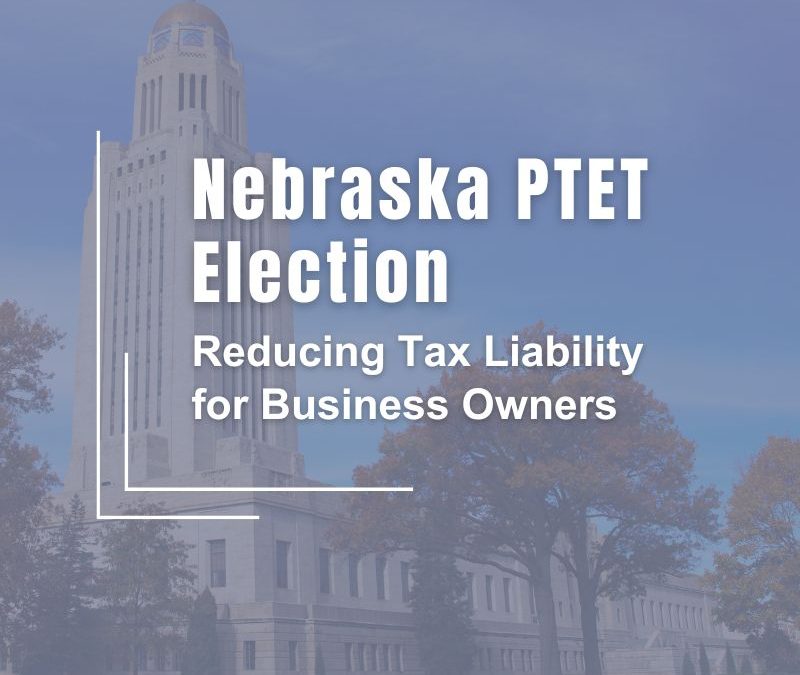Reducing Federal Tax Liability for Nebraska Business Owners
September 7, 2023 — On May 31, 2023, Governor Jim Pillen signed LB754 into law. Among many other tax provisions in this bill, Nebraska joined 35 other states that have already enacted a “Pass-Through Entity Tax” (PTET) Election. This election will be available to entities for tax years beginning in 2023, but there’s also a retroactive component that will allow entities to take advantage of these rules based on 2018 through 2022 income.
Overview
The PTET Election allows pass-through entities (S-Corporations and Partnerships) to elect to pay and deduct Nebraska income taxes on the pass-through income at the entity level, creating a federal tax deduction for the taxes paid. Historically, business owners of a pass-through entity would report their share of the pass-through’s income, pay all of the taxes due to the state, and have the ability to deduct those state taxes if they itemized. Due to changes made as a part of the Tax Cuts and Jobs Act (TCJA) beginning in 2018, taxpayers are only allowed to deduct $10,000 of state and local taxes, if they have enough deductions to itemize. This resulted in many taxpayers not being able to fully utilize their Nebraska tax payments to reduce their Federal taxable income.
Election Forms and Payment Timing
On Friday, September 1, 2023, Nebraska finalized their forms for making this PTET election. These finalized forms include both the current year election, as well as the retroactive elections. Once the elections are made, they are irrevocable and give the business the ability to deduct its’ state taxes, providing a way around the tax cap in the TCJA. The election forms are not mailed to Nebraska but are filed electronically on the Department of Revenue’s website.
To make an election for 2023 and future tax years, the entity file must file an election form, Form PTET-E, with the Department of Revenue. This election is year-by-year, so businesses can choose each year whether or not to make the election. The election form can be filed as late as the due date (including extensions) of the pass-through return. As a result, an entity could technically elect as late as September 15, 2024 for the 2023 tax year. However, in order to get the tax deduction and the refundable credit in the current year, timing will be important.
- A cash-basis entity will need to both file the election and make a payment before the end of the tax year in order to get a deduction for the state taxes.
- In many cases, an accrual basis entity will be able to elect into the Recurring Item Exception and accrue the taxes at year-end, though they will need to file the election form by year-end in order to qualify.
The election itself can be filed electronically on the Department’s website, and payment instructions are included with the forms.
Nebraska Retroactive Elections
Additionally, Nebraska is allowing the pass-through election to be made retroactively for tax years 2018 through 2022. Businesses have until the end of 2025 to make this retroactive election, and they have the flexibility to choose the year(s) to take the deduction for those retroactive deductions on their 2023, 2024, or 2025 business tax return. If a prior year resulted in a loss, no election for that year should be made. However, businesses have the ability to retroactively elect for all five years or pick and choose what years to elect, allowing businesses to only select years with Nebraska taxable income.
This retroactive credit, while based on the income from those prior tax years, impacts the current owners. As a result, amended returns will not be required to take advantage of the retroactive PTET election. The benefits of this retroactive election will belong to the current shareholders/partners as of when the election is made.
Potential Impact of Retroactive Elections for Business Owners
While the retroactive PTET election can lead to some significant tax savings for business owners, it should be pointed out that paying five years (or potentially six years, including 2023) of tax all at once can create cash flow challenges for a business. For the current year election, this would just be the entity paying the tax rather than the individuals, which should be manageable. Businesses would just need to distribute less cash to owners to retain money for those payments inside of the business.
However, the retroactive election will work a little bit differently. In this case, businesses will need to elect to claim the retroactive PTET and make a payment to the Nebraska Department of Revenue out of the business account. The business owners will then all receive a refundable credit for those taxes, which will be able to be refunded to them when they file their individual tax return for the year of the election. In the end, the total cash spent to claim the retroactive PTET election is $0. The business will pay an amount, resulting in all of the owners receiving a credit for the same total amount. There will, however, be a lag in timing between when the entity pays the tax and when the owners see a refund.
Whether an entity is cash- or accrual-basis, it does appear that a payment would need to be made within a particular tax year to claim the retroactive PTET in that year. Moving forward, an accrual-basis entity would not necessarily need to pay in the same year to claim the deduction, as long as they had made the election. Cash-basis entities would need to both make the election and pay the tax before year-end to secure the deduction.
It may be more complicated for individuals who are shareholders or partners in a large number of entities to determine whether all or some of the entities will make the PTET election. The election is made at the entity level, not the owner level, so owners are bound to whatever the business decides to do. If you have a more complex situation like this, it is important to know that the decisions made by the entities may not always be clear-cut, and communicating with the individual entities will be important in the process.
Summary
What are the benefits of making the PTET Election?
- Shareholders and partners of electing entities may not be required to make Nebraska estimates with their personal tax return.
- Out of state shareholders will not be required to file a Nebraska tax return if the pass-through entity is their only Nebraska-sourced income.
- Pass-through entity owners will be guaranteed a federal tax deduction and will not have to rely on itemizing on their individual income tax returns.
- As stated above, the retroactive PTET election will be able to be made without requiring amended tax returns from prior years.
- If the election is made in 2023, cash-basis taxpayers will need to make the Nebraska income tax payment before year-end end to deduct the state taxes on the 2023 tax return for the business.
- Accrual-basis entities can accrue the deduction and pay in 2024 if the election is made before year-end and the amount is reasonably certain. (Applies to the current year tax, not necessarily the retroactive PTET.)
Who should make the PTET Election and what are the next steps?
- Almost all pass-through entities operating in Nebraska with taxable income should consider making the election.
- Out of state businesses with significant Nebraska sourced income should also consider making the election.
- Taxpayers should consider not making third or fourth quarter individual Nebraska tax estimates and instead have the business make the payments. If shareholder/partner estimates are made it will result in a refund for the individuals, but the refund may be delayed.
Additional information
- For entities that elect into the PTET, any tax due will be due on April 15 each year, as the law treats these entities like corporations for purposes of the tax.
- The amount of tax that the pass-through entity must pay is a flat rate of 6.64% for 2023 but is scheduled to phase down to 3.99% by 2027.
- As the tax rates go down, the value of the election will get smaller, but it will still often be a benefit for businesses and their owners to take advantage of.
- If a business makes the election for 2023, no underpayment penalties will be assessed, which means that the entity is not required to make estimated payments for this year and will be able to make the full payment of taxes due on April 15, 2024.
- It may still make sense to make a payment sooner for deductibility reasons.
- In any tax year after 2023, including the first year a business elects this, estimated payments will be required or the business will be subject to underpayment penalties.
- The election is made on an annual basis and does not need to be made until the due date of the tax return, including extensions. This gives businesses flexibility if taxable income is uncertain for the current year.
- However, a business will want to consider timing of the election and payments from the standpoint of when the tax can be deducted.
- Once the election is made, businesses should begin making quarterly estimates to cover the entity’s Nebraska income taxes for future years.
- If you owned a business that had income in Nebraska during any part of 2018 through 2022, but the business has been sold or has been shut down, you are not able to take advantage of the retroactive PTET election.
- However, if you’ve bought a business or bought into a business since 2018 and were not an owner for the whole five years, you can still take advantage of the retroactive PTET and benefit from the election.
Moving Forward: HBE is Here to Help
It is important for our clients to understand that this new law will require them to take certain actions to ensure compliance and take advantage of the tax benefits. At HBE, we are committed to helping you navigate these changes and will be communicating more details as guidance emerges on both the regular and retroactive PTET elections. Our trusted advisors are available to answer any questions and provide guidance on how to take advantage of this Nebraska tax reform opportunity.






